Launching an ecommerce site without search engine optimization (SEO) is akin to opening a high-end seafood restaurant in a deserted parking lot.
Sure, you serve amazing food — but that doesn’t mean anyone looking for amazing food will find you.
SEO helps people find your products when they search for them online. When implemented properly, it places your products in top positions on search engine results pages (SERPs). For example, if you sell earrings for sensitive skin, a customer should find your store quickly by searching for “giant gold hoop earrings for sensitive earlobes”.
As helpful as it is to your business, good ecommerce SEO doesn’t come easy. It requires legwork and you building on the right foundation – choosing the best ecommerce SEO platform.
Why does my chosen ecommerce platform matter to search engines?
SEO operates on certain principles. Ignoring them is like ignoring traffic lights and road rules and expecting to arrive at your destination safely. Your ecommerce business won’t attract much organic traffic by ignoring the principles of SEO.
So, let’s make these principles clear.
Search engines recognize and reward ecommerce sites that a built with a certain type of structure behind them. This structure includes easy “crawalability” by search engines, intentional page titles, keyword-embedded URLs, relevant meta descriptions, mobile optimization, targeted key phrases, descriptive alt-text, and fast site speed, among others.
That’s a lot to keep in mind multiplied by however many product pages you have.
No matter how many — or how few — products you plan on selling, coding these elements in manually for each and every product page probably is impractical for you as a business owner. The good news is that some ecommerce platforms are better than others at putting these elements within your control.
If you build your store on an ecommerce platform with SEO-friendly features, you significantly reduce the headaches involved in getting organic traffic to your store.
So, how do popular ecommerce platforms compare in the battle for “SEO friendliness”
The Best Ecommerce Platforms for SEO (& Why)
To help you decide while keeping things short and simple, we’ll evaluate five of the leading ecommerce platforms.
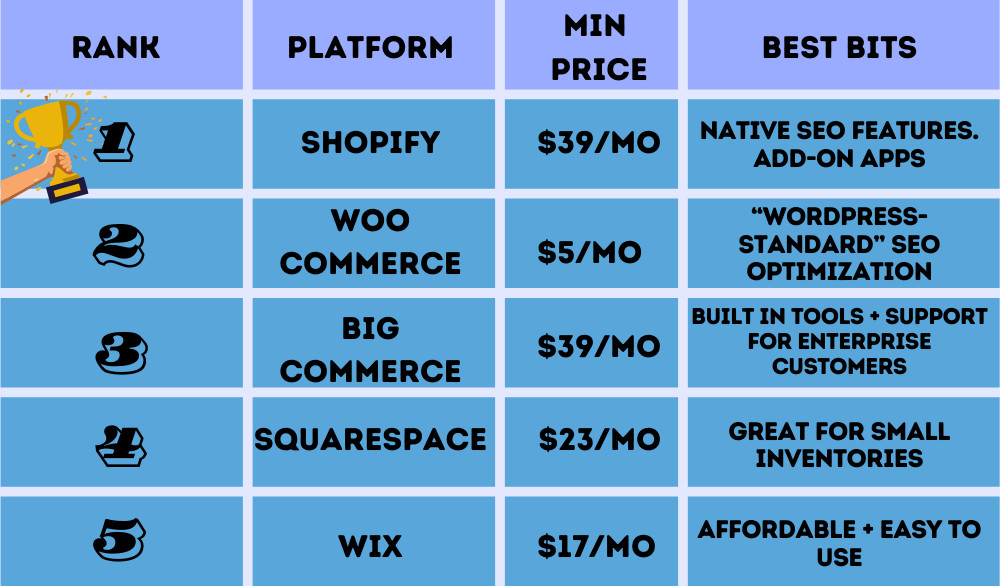
1. Shopify
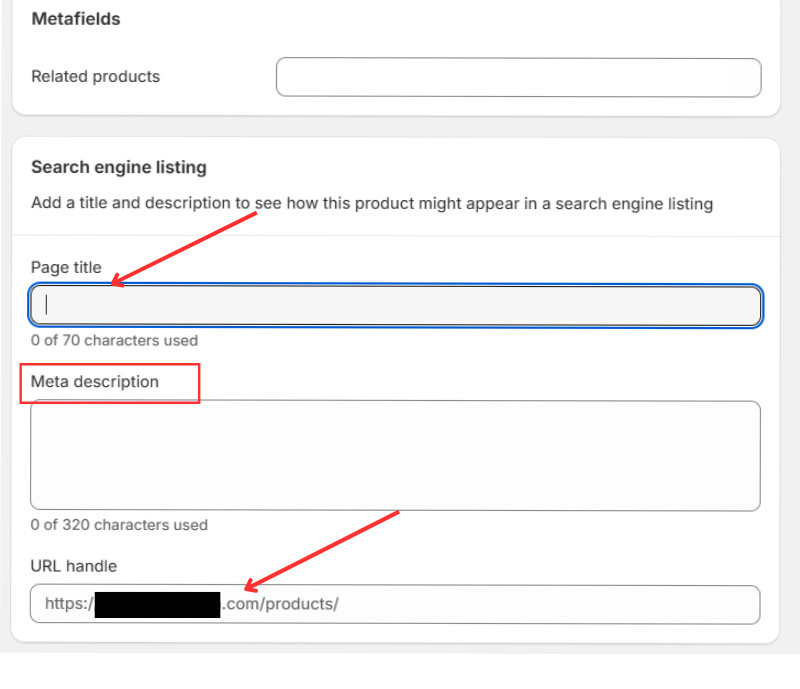
Our top choice of the best ecommerce platform for SEO has to be Shopify, thanks to its organized structure and clean coding.
As a market leader hosting more than a million stores globally, Shopify is marketed as an all-in-one solution with a payment gateway, store hosting, fulfillment center, email marketing, etc all fully integrated. With this market positioning, it would be surprising if Shopify’s effort in something as crucial as SEO were lacklustre.
When it comes to search engine appeal, Shopify offers extensive SEO capabilities to help, not hinder, its merchant’s SEO performance. It offers ecommerce store owners built-in SEO tools for creating well-structured ecommerce businesses that search engines can index efficiently.
These include a powerful combination of auto-generated canonical tags, automatically generated robots.txt/sitemap.xml files, customizable URLs, auto-generated title tags, and editable SEO fields. In addition, it integrates well with third-party SEO plugins like Plug In SEO that you can use to quickly run an SEO audit of your store or track the progress of your SEO efforts.
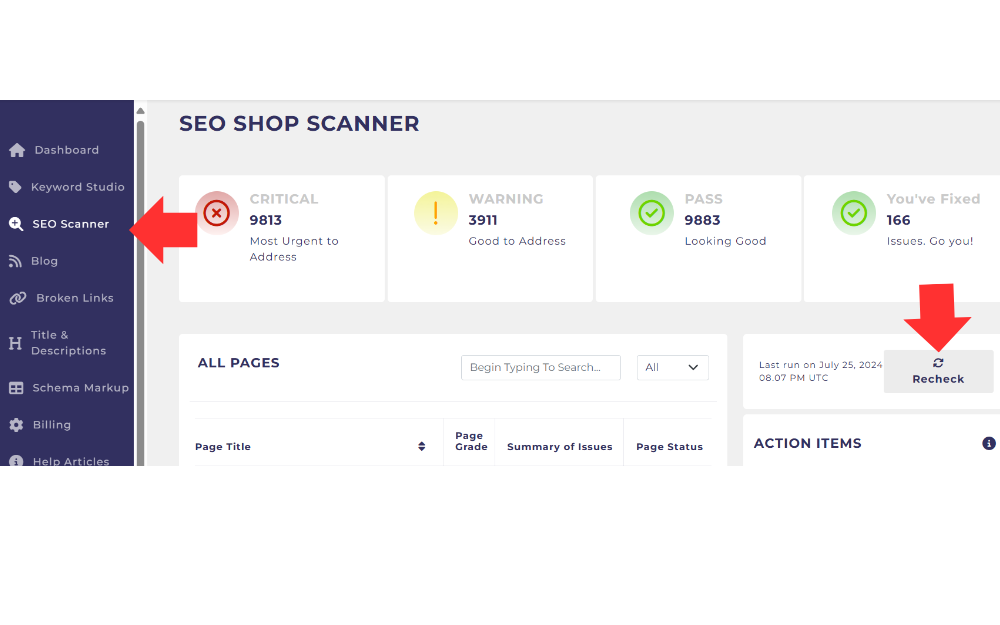
For example, when creating a product, Shopify’s native product page allows you freedom to edit key SEO needle-movers like H2/H3 sub-headers, meta descriptions, and even your product’s URL to match long-tail keywords. In-built flexibility to add and edit alt text on product images, also give you a shot at ranking on search engines through image search.
Shopify also features a blogging platform that helps you build up SEO karma for product-related topics. The built-in blogging feature lets you edit title tags, meta descriptions, and URLs for any page type.
2. WooCommerce for WordPress
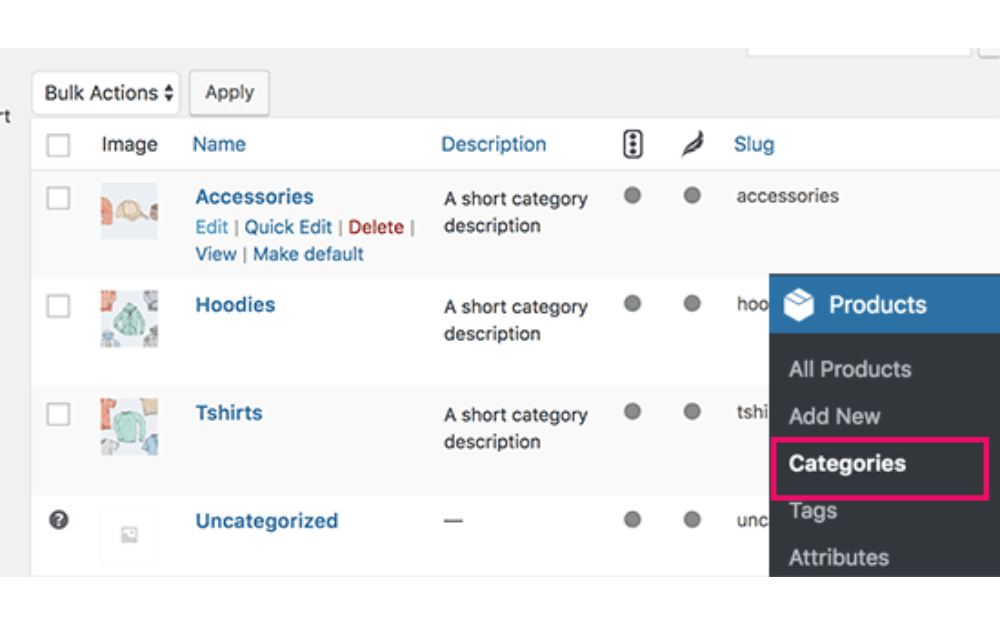
Anyone who’s been part of the SEO space in the last 20 years knows that the WordPress platform helps sites excel with SEO. This is partly due to in-built blogging tools, customizable URLs, easily editable titles, meta descriptions, and more.
WooCommerce is a free open-source WordPress plugin that turns your website into an ecommerce site, with additional ecommerce capabilities. WordPress users choose WooCommerce for its low barrier to entry (free to download), high customizability as an open-source solution, connectivity to third-party apps and extensions, and of course, powerful native SEO features.
However, when it comes to usability, WooCommerce is not the easiest platform to use if you don’t have a technical background. It can be tricky to add to your website and manage unless you have a team of developers at your disposal. Being an open-source tool, you’ll need to modify and manipulate code to create your storefront versus using simpler backend design tools available with WordPress.
Additionally, you’re responsible for your own security and compliance measures with Woocommerce. Also, if any of your customizations break after you update your website, you’ll have to fix them yourself. For this reason, it might not be as scalable as other solutions. Broken links, inactive pages, and site errors can negatively affect your website’s SEO, especially as you add new products or collections.
While WooCommerce isn’t accessible to non-WordPress users, it takes second place for its robust SEO capabilities as an ecommerce SEO platform. WordPress is already known as an SEO-first platform, so it’s only natural that its ecommerce SEO tools do what it says on the tin.
3. BigCommerce
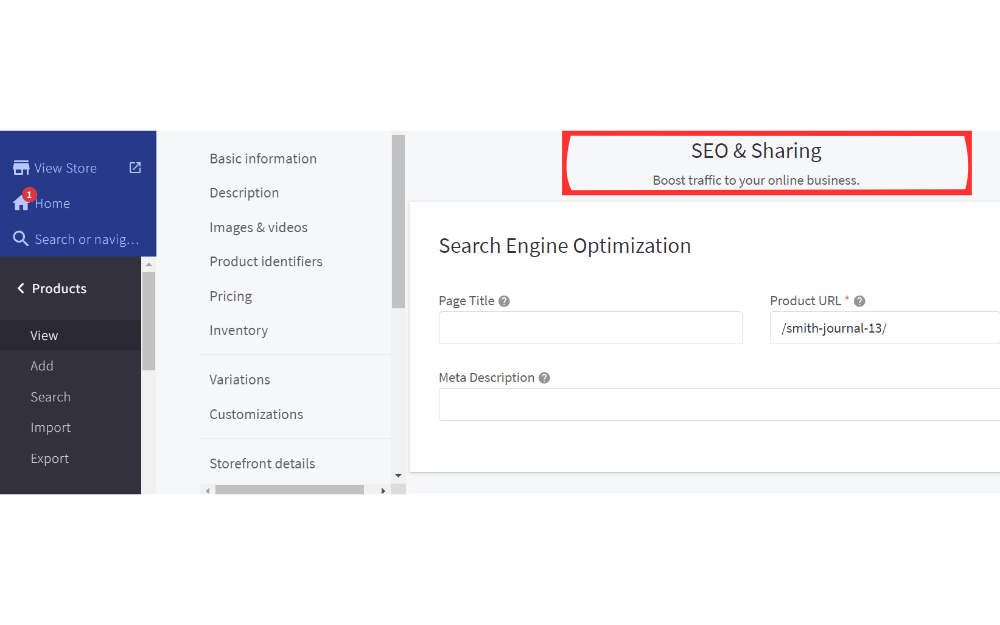
Meant for mid-sized or enterprise brands, BigCommerce is known for its sophisticated design options. It has a native suite of tools, including marketing and analytics, and comes with industry-standard customer support (especially for its enterprise customers).
Depending on your business needs, BigCommerce helps you hit the ground running quickly especially with great design capabilities and out-of-the-box PCI compliance.
BigCommerce’s SEO features, such as editable robots.txt files and mobile-responsive templates, also contribute positively to your site’s search engine rankings.
While BigCommerce does have helpful SEO features, it doesn’t appear to have built-in support and instructions for beginners. Users complain about needing developers for tasks as simple as creating good-looking pillar page content, so this might not be the best ecommerce platform for SEO if you run a lean team.

While it offers some native SEO features, BigCommerce comes third on our list of fast and SEO-ready ecommerce platforms for its complexity and difficulty of use. However, it is a good option for its blogging functionality, built-in 301 redirects, and editable robots.txt files, among others
4. Squarespace
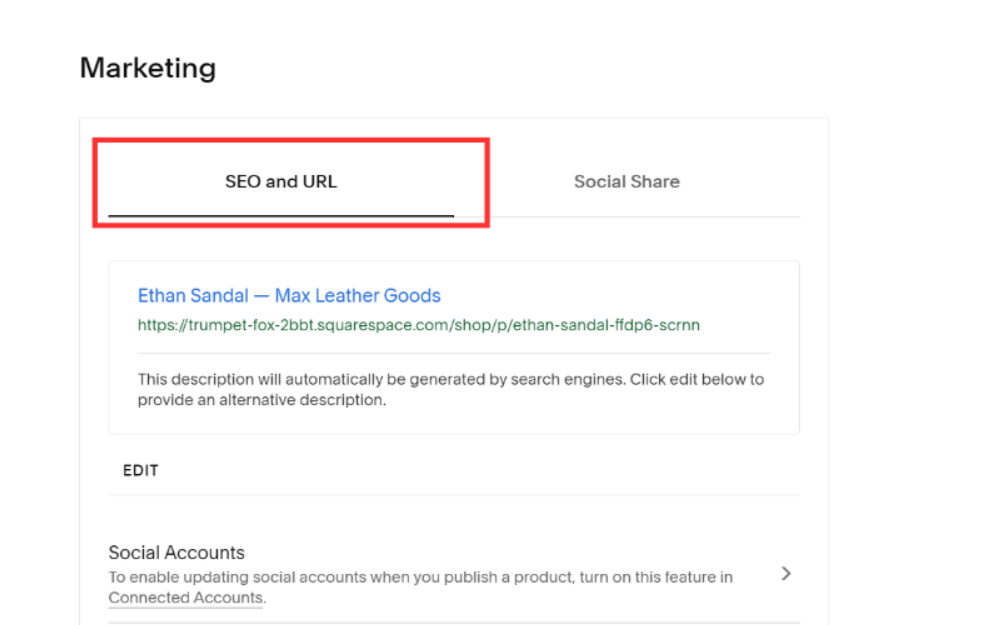
A well-known option for building websites, Squarespace excels in ecommerce sites that are easy to design and manage. It’s incredibly easy to use since it has a drag-and-drop editor.
The platform is well-built for not only selling products, but also selling services, scheduling appointments, and managing subscriptions. It also helps its users keep track of tax-related information and optimize checkout options, including abandoned cart recovery features.
While it’s a simpler platform option, Squarespace helps its customers manage SEO with built-in blogging features, customizable URLs, built-in 301 redirects, mobile responsiveness, third-party plugins, and editable meta titles and descriptions, among others.
Despite its ease of use, Squarespace isn’t as robust as some of the other options we’ve explored. For example, it isn’t the easiest to use when generating content for SEO. You can’t autosave or undo your changes. Additionally, it’s not very good at handling large inventories without compromising your site speed – a hard no if you have a large inventory list.
5. Wix
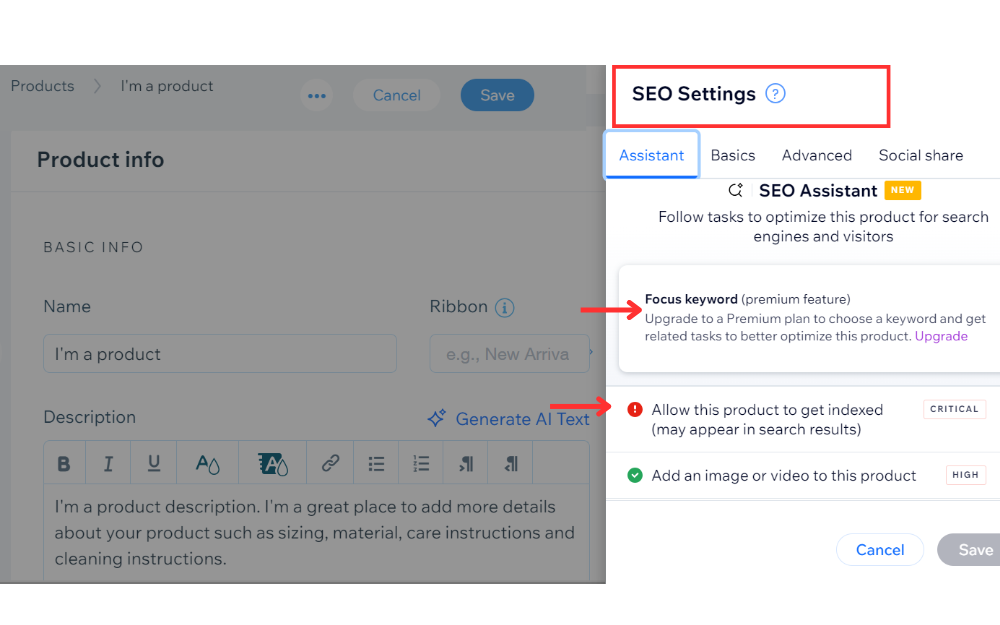
Similar to Squarespace, Wix is a user-friendly and easy-to-navigate platform. While not designed specifically for ecommerce, it is marketed as a “powerful website builder”. As Squarespace does provide slightly more built-in SEO tools for ecommerce sites, Wix lands below it on our list.
Entrepreneurs and small businesses like Wix for its user-friendliness. Its simple and straightforward features make it easy for non-techies to create functional storefronts quickly.
Wix websites are low maintenance but professional looking, with a huge catalog of modern-looking design templates at your disposal. Additionally, all Wix websites are hosted on their own servers for optimum speed and security. As an ecommerce platform, Wix provides a limited range of built-in SEO features, some locked behind a paywall. However, it does offer over 300 apps on its marketplace, including ones for SEO and marketing.
As the fifth option in our five-part list of top ecommerce SEO platforms, Wix comes with its drawbacks. First, its features aren’t quite as robust as other options – plus, it’s not customizable enough for larger businesses’ needs.
Since it wasn’t built with ecommerce top of mind, the software restricts storage and API calls or interactions between programs. This means you’ll have to pay more for upgrades as your business grows. Also, if you ever want to switch your theme, you’ll have to start from scratch since there’s currently no easy way to transfer content from one template to another.
While Wix is a budget-friendly platform with some SEO-boosting features, it is primarily optimized for ease of use and management. For those looking to start without prior knowledge of website building, it’s a great option. If however you’re serious about SEO, consider other options or prepare to overcompensate by turbocharging off-page SEO strategies such as link building and content marketing.
The Right Ecommerce Platform is a Solid Business Foundation
Choosing a purpose-built, SEO-optimized ecommerce platform for SEO like Shopify anchors your ecommerce business to the right foundation.
However, while it might make your journey easier, simply choosing an optimized platform isn’t good enough in today’s competitive landscape. You need to track your search performance using tools like Google Search Console, Google Merchant Center, and Google Analytics.
Third-party add-ons like Plug In SEO that complement your SEO strategy with audits, JSON-LD structured data, broken link fixing, and keyword targeting make your job much easier while helping your ecommerce website take up higher positions in search engine rankings.
It’s important to keep in mind that search engine optimization (SEO) is a long-term strategy. Results may not be immediate, but investing time and effort now is crucial for reaping the rewards of higher organic traffic in the future.




